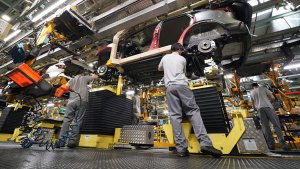Matching Employers To Candidates Should Be Easy
Matching employers to candidates is hard, but it really doesn’t need to be.

The trouble is that even as the balance of power shifts towards employers, hiring remains incredibly difficult for many organisations. It’s inefficient and essentially broken for today’s working environment.
You might think that declining vacancies and rising redundancies would make it easier to recruit people but the reality is more complex and history tells us job security becomes even more important during times of uncertainty.
The challenge of inefficient hiring is particularly acute for small businesses who, unlike larger companies, don't always have the tools, time or people power to iron out creases in their hiring practices. And with small businesses being responsible for 48% of employment in the UK in 2022, getting the process right for them can have a huge impact on the economy.
What can be done to level the playing field for small businesses to help them attract the right candidates and keep growing their companies?
Using technology to supercharge hiring
As with many other processes, tech – and artificial intelligence – have the power to disrupt hiring and help small businesses attract quality workers quickly.
The whole world appears to have had a eureka moment about how AI will change all our lives. It’s undoubtedly an exciting moment.
But our industry has been slow to adapt and generally it remains quite far behind other industries. Streaming services like Netflix are a great example of a model that’s got user experience right.
Just think, you’ve finished watching The Witcher and want something else to binge. Netflix gives users personalised recommendations from across its entire catalogue based on your watch history and preferences you gave when you first set up your account. It’s fundamentally quite simple – but it can be done at massive scale thanks to AI.
If it’s that simple in principle, why can’t the hiring process follow suit?
The truth is that it can and should.
AI has the power to revolutionise how small businesses hire, enabling them to match to the most relevant candidates, including recommending those they might otherwise choose not to pursue, but who could actually be exactly the right person for the job.
Jobseekers could also win by having roles recommended to them based on their CVs to help them find jobs faster.
AI is not a new technology to recruitment. At Indeed, machine learning was part of our founding principles when we launched almost 20 years ago, and now we focus on using it to drive preferences and speed of hiring.
Using 140 million qualifications and preferences that have been voluntarily shared by jobseekers and employers each day on average, we can then use the data to connect them to each other. It’s led to hiring times reducing by 19%.
And, as new technologies like generative AI become more mainstream, it will be interesting to see how they can make hiring better too, but there’s no reason why the industry can’t use existing solutions like matching to improve the process now.
Match with the best
Connecting employers with the right candidates is arguably the most important function within a hiring team. Getting that right is particularly important for small businesses, which may not have large teams that can vet jobseekers to find the right candidates. In some cases, it could even be up to the hiring manager to review applications, taking them away from their day job.
That’s where matching technology can make a critical difference.
Rather than just posting a job ad, matching technology enables businesses to identify the candidates that are right for the role and potentially even invite them to apply. It can lead to a much faster hiring process by finding the right person sooner.
Why it matters
Matching could also make it easier for businesses to find the right person. Given our research shows it takes SMBs 23 days to fill a role on average in the UK[1], getting it right first time could cut a significant amount of waste, getting new employees onboard and delivering results sooner.
It can also have a huge positive impact on the wider economy. Research by the OECD shows that those who don’t have enough financial support for more than three months risk falling into poverty, so faster hiring means they can be contributing and spending sooner and lessening any potential burden on public finances. And that could all be enabled by giving small businesses access to better tech to hire the right people.
The future of hiring
With small businesses representing such an important part of the UK’s economic infrastructure, failing to give them access to the people they need is effectively killing the country’s prospects of recovery.
That needs to change today.
The technology exists to disrupt a broken and inefficient hiring process. It helps get more people into better work where they can innovate and thrive, enabling businesses to thrive and stimulate sustainable economic growth that benefits everyone.
[1] Indeed USA and UK Employer Survey, March 2023, N=376
Raj Mukherjee is Executive Vice President at Indeed.
Thanks for signing up to Minutehack alerts.
Brilliant editorials heading your way soon.
Okay, Thanks!

